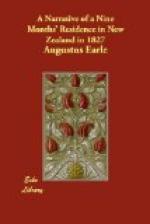This was the first instance on record, in which these people had laid a statement of their private wrongs before a public assembly consisting of deputies from every part of the island, and abided by the decision of the majority; and it was the only instance of a chief being killed in battle, and his decease not having been followed up by the plundering and destruction of his whole family or tribe.
This had been a question of peculiar interest to us Europeans, as several of their great men had fallen in a skirmish (whether an accidental one or a decided combat made not the slightest difference). We knew their barbarous custom; and, consequently, we were preparing for scenes of deadly revenge and insatiable fury to be acted by both parties, and which must have involved all settled here in destruction. Our feelings may therefore be imagined, when we were informed that a parliament had been convened, and all the parties interested were present by invitation, and took part in the debate. A central spot was fixed on to accommodate the various chieftains. The causes of the accident were then explained; they wept and lamented the fallen chiefs, and finally retired satisfied to their several homes. Surely everyone who is interested in tracing our own form of government, from the present time up to its first rude outline, will perceive the similarity of causes and events, and will anticipate the glorious prospect of beholding a clever, brave, and, I may add, noble race of men, like the New Zealanders, rescued from barbarism. This pacific and rational discussion among the chiefs seems, in reality, to give promise of the germ of a regular reform. Should a few more such meetings take place, and terminate in the same amicable manner (and I think it very probable), some clever individual may rise up amongst them, take the reins in his own hands, and establish something like a regular form of government.
CHAPTER LI.
OBSERVATIONS ON THE SOCIAL CONDITIONS OF THE MAORIS.
Feeling that I was not likely now to be called upon to act offensively, I considered myself at liberty to make numerous excursions round our fortress, not only to admire this fertile and beautiful country, but to visit some of my old friends. I was very much astonished and shocked at seeing several very beautiful young women, whom I left only a few months back in perfect health and strength, now reduced to mere “living skeletons,” and also to hear of the death of others by consumption. This disease seems to be the scourge of the young; and when they are once seized with its symptoms, they are very speedily brought to the grave. The natives say, “It is Atua, the Great Spirit, coming into them, and eating up their inside; for the patient can feel those parts gradually go away, and then they become weaker and weaker till no more is left; after which the Spirit sends them to the happy island.” They never attempt any means of curing or of alleviating the pains caused by this cruel complaint; and all those under its influence are tabooed. I procured from the brig all my remaining stores of tapioca, sago, arrowroot, and sugar, and distributed them in the best way I could amongst my sick friends. They were anxious for wine; but that portion of my sea-stock, as well as spirits, had been long since expended.




